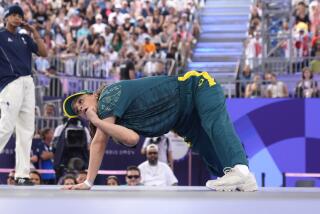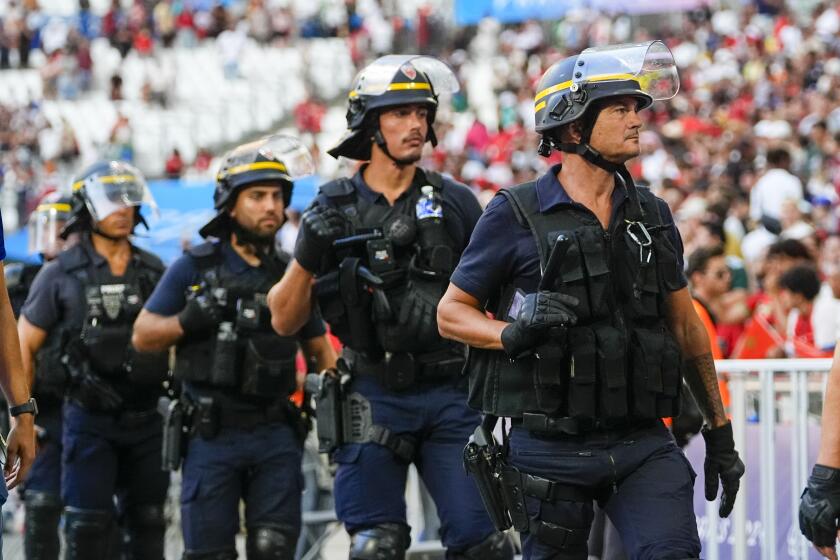COLUMN LEFT/ GEORGE BLACK : Overkill by the Overpaid at Barcelona : ‘Dream Team’ is a misnomer. Real dreams involve risk. Americans want a sure thing.
Since they first lined up in their tuxedos under the klieg lights, the members of the Dream Team seem to have spent more time answering reporters’ questions than they have on the basketball court. Of all the hundreds of statements they have made, three stick in the memory.
Magic Johnson: “It’s one thing to be a bully and it’s another thing to be beautiful.”
Charles Barkley: “We’re just the ‘Boyz N the Hood.’ ”
Michael Jordan: “We’ve got to regain our sense of pride, our dignity. Some way--even if it’s just basketball. We can at least show the world that we can take control of something.”
In the run-up to the Barcelona Olympics, the Dream Team has done all that was expected of it, demolishing all comers, humiliating opponents from Cuba to France. Now comes the real thing, starting on Sunday with a contest against mighty Angola.
Angola presumably used to have one of those extravagant Soviet-model sports programs that was designed to prove the superiority of socialism through the cult of physical fitness. But no longer. The withdrawal of state subsidies in the former Soviet Bloc will now supposedly “level the playing field,” to use that hoariest of sporting metaphors. In Barcelona, there will be no more embarrassments like those in Seoul four years ago, when both Yugoslavia and the Soviet Union had the temerity to finish ahead of the United States in basketball-- our sport.
Goskomsport, the huge Soviet agency that once funded 12,000 coaches and 25,000 athletes, has been closed down. The German Democratic Republic, which carried off 582 medals in nine Olympiads from 1956 to 1988, is no more. Its “rippling Brunhildes” of track and field, as the Economist once called them, must now compete as part of a unified Germany, without their old perquisites.
Soviet Bloc athletes are now reduced to writing letters to the likes of McDonald’s and Coca Cola, begging for the corporate sponsorship that will allow them to go on competing. If any single symbol captured the Zeitgeist after the fall of the Berlin Wall, it was an offer by Nike to the East German champion sprinter Katrin Krabbe: 25,000 deutsche marks for each of her future gold medals. Small potatoes, of course, compared with the sums that Nike and its competitors, Reebok and Converse--are prepared to lay out on home-grown talent. Nike’s clients on the Dream Team include not only Jordan and Barkley, but also Chris Mullin, Scottie Pippen, David Robinson and John Stockton. Watching Michael Jordan play basketball may be glorious, but the man is also a walking corporate billboard, earning an estimated $11 million a year by plugging everything from Nikes and lottery tickets to Chevrolets and Gatorade.
The corporate wars over the Dream Team leave no doubts about who calls the shots at this Olympiad. Nike, for example, with six players on its roster, insists that no commemorative T-shirt or other article of clothing can bear the image of “its” athletes. To their shame, the National Basketball Assn. and USA Basketball, the sport’s governing body, have caved in to this demand. The time when the Olympics were an amateur affair seems as quaint and remote as the days of horse-drawn carriages.
Magic Johnson’s comment about bullies and beauty implicitly recognizes the arrogance of the Dream Team concept, while pleading the false innocence that is still a required part of this country’s national self-image. Charles Barkley’s remark perpetuates the sour illusion that the hoops represent a real avenue of choice for African-American youth. But it is Michael Jordan who hits it on the nose.
Since primitive times--and perhaps we still live in them--competitive sports have been surrogates for war and trade, proving grounds for national pride. The Dream Team is how America proves its manhood these days--by overkill.
We call them the Dream Team, but that’s a misnomer. Real dreams involve risk. These days, Americans only seem to want dreams that are a sure thing. No suspense, no drama, only edited highlights. The Barcelona Dream Team is the latest in a recent tradition of slam-dunking inferior adversaries, from Grenada to Desert Storm. Its victories are real end-of-empire stuff, like the last gold medals of the muscle-bound East Germans, doped to the gills on steroids in Seoul.
In every way, in fact, the basketball gold in Barcelona will be a fitting end to the years of Reagan and Bush--that Bad-Dream Team which will, one hopes, take only the silver medal in the other great competitive circus of 1992.
More to Read
Go beyond the scoreboard
Get the latest on L.A.'s teams in the daily Sports Report newsletter.
You may occasionally receive promotional content from the Los Angeles Times.





